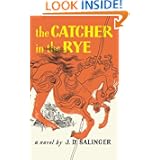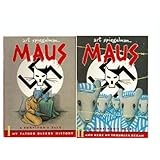"What really knocks me out is a book that, when you're all done reading it, you wish the author that wrote it was a terrific friend of yours and you could call him up on the phone whenever you felt like it."
It would be incredibly awkward if J. D. Salinger were my terrific friend because I really would not want to call him up after finishing it. In fact, I am already a book and a half ahead of this book, but have been dragging my feet on writing a review because I didn't feel that I could justify my mixed feelings that land on the side of disliking this book. I still don't think so, but I really want to talk about my next book which handles growing up, recognizing evil in the world, etc so much better (To Kill a Mockingbird ftw).
"I don't know exactly what I mean by that, but I mean it."
"You'll find that you're not the first person who was ever confused and frightened and even sickened by human behavior."
Oh Holden. The way he says things passionately (with much cursing and repetitive turns of phrases that feel very much like I'm-trying-to-develop-my-catch-phrases) without knowing what he means but feeling self-righteously angry about what he means is...boring to me. When his former teacher reveals that Holden is going through a universal experience about being confused, frightened, and sickened, my thought is...get some real problems. Well, he has real problems (Allie's death), but he pretends that that is not what is bothering him at all - and maybe it's not, I really can't speak for him. However, he is too much of a bored rich kid whose 'problems' (everyone is phony, everything is boring, everything and everyone is stupid, high school sucks) are too dumb to get my sympathy. [Full disclosure: I have a real problem with people with money (especially that was not earned by them). It is not fair, but everyone has their prejudices, and this is mine. I am not particularly worried that my prejudice is affecting my reading of books - I think I (and the book) will survive this injustice.]
"People never notice anything."
"People never believe you."
"People are always ruining things for you."
"People never give your message to anybody."
"People never think anything is anything really."
"Sex is something I really don't understand too hot...sex is something I just don't understand. I swear to God I don't."
Sometimes I actually liked Holden. I am a high school teacher, and I love my job, and you cannot love teaching high school unless you love teenagers. Teenagers are hyperbolic and absolutists (see above lines about people are always and people are never - very typical) and very confused by the world while pretending they're not (see above line about sex in the midst of quite a lot of apparently fake confidence about being sexy and making it with the ladies). I get that - I was there, and I see my students there, and when Holden is very teenager (in the moments where he cries, admits he doesn't understand something, has honest emotions) I sympathize. However, these moments are so few and far between (the betweens just being him acting like an asshole and a richie) that it doesn't sustain my sympathy for him throughout the text.
"I started giving the three witches at the next table the eye again...they started giggling like morons...I'm not kidding, they were three real morons...God, could that dopey girl dance...she came out with this very dumb remark...she really was a moron...I let it drop. It was over her head anyway...they were too ignorant...you could hardly tell which was the stupidest of the three of them...do you think you could get an intelligent answer out of those three dopes?"
Having just taken a gender studies class, I couldn't help but rereading this scene (where Holden encounters the three tourists in his hotel's bar) and looking for all the misogyny. Holden is really afraid of women or has an inferiority complex or just hates them. This scene plus kissing a crying girl who gives no appearance of consent plus his worry over his roommate making it with a girl while he is also talks about making it with girls plus his hiring of a prostitute....ugh. I hope some day someone has a serious conversation with him about how damaging his thought process is.
This is my second reading of The Catcher in the Rye. My first was near the end of high school/beginning of college (it left that much of an impression on me), and I really felt like I was too old for it. I definitely had more of an appreciation for it, but it just doesn't hit anywhere near the top of my Great Novels List. I read many reviews around the web about why people loved this book and noticed that the people who love it love it unreasonably. Ask why it's so great, they will roll their eyes at you and tell you to go back to reading Dean Koontz, Dan Brown, and Stephanie Meyer, because clearly you cannot understand any great literature if you cannot understand this book.
Catcher in the Rye is one of my juniors' summer reading books and while I am curious to see what the contemporary teen thinks of it when I grade their homework, I'm totally okay with the fact that we probably won't spend a heck of a lot of time talking about it.
I do think that I will try to buy myself this T-shirt because I think it's funny.
It would be incredibly awkward if J. D. Salinger were my terrific friend because I really would not want to call him up after finishing it. In fact, I am already a book and a half ahead of this book, but have been dragging my feet on writing a review because I didn't feel that I could justify my mixed feelings that land on the side of disliking this book. I still don't think so, but I really want to talk about my next book which handles growing up, recognizing evil in the world, etc so much better (To Kill a Mockingbird ftw).
"I don't know exactly what I mean by that, but I mean it."
"You'll find that you're not the first person who was ever confused and frightened and even sickened by human behavior."
Oh Holden. The way he says things passionately (with much cursing and repetitive turns of phrases that feel very much like I'm-trying-to-develop-my-catch-phrases) without knowing what he means but feeling self-righteously angry about what he means is...boring to me. When his former teacher reveals that Holden is going through a universal experience about being confused, frightened, and sickened, my thought is...get some real problems. Well, he has real problems (Allie's death), but he pretends that that is not what is bothering him at all - and maybe it's not, I really can't speak for him. However, he is too much of a bored rich kid whose 'problems' (everyone is phony, everything is boring, everything and everyone is stupid, high school sucks) are too dumb to get my sympathy. [Full disclosure: I have a real problem with people with money (especially that was not earned by them). It is not fair, but everyone has their prejudices, and this is mine. I am not particularly worried that my prejudice is affecting my reading of books - I think I (and the book) will survive this injustice.]
"People never notice anything."
"People never believe you."
"People are always ruining things for you."
"People never give your message to anybody."
"People never think anything is anything really."
"Sex is something I really don't understand too hot...sex is something I just don't understand. I swear to God I don't."
Sometimes I actually liked Holden. I am a high school teacher, and I love my job, and you cannot love teaching high school unless you love teenagers. Teenagers are hyperbolic and absolutists (see above lines about people are always and people are never - very typical) and very confused by the world while pretending they're not (see above line about sex in the midst of quite a lot of apparently fake confidence about being sexy and making it with the ladies). I get that - I was there, and I see my students there, and when Holden is very teenager (in the moments where he cries, admits he doesn't understand something, has honest emotions) I sympathize. However, these moments are so few and far between (the betweens just being him acting like an asshole and a richie) that it doesn't sustain my sympathy for him throughout the text.
"I started giving the three witches at the next table the eye again...they started giggling like morons...I'm not kidding, they were three real morons...God, could that dopey girl dance...she came out with this very dumb remark...she really was a moron...I let it drop. It was over her head anyway...they were too ignorant...you could hardly tell which was the stupidest of the three of them...do you think you could get an intelligent answer out of those three dopes?"
Having just taken a gender studies class, I couldn't help but rereading this scene (where Holden encounters the three tourists in his hotel's bar) and looking for all the misogyny. Holden is really afraid of women or has an inferiority complex or just hates them. This scene plus kissing a crying girl who gives no appearance of consent plus his worry over his roommate making it with a girl while he is also talks about making it with girls plus his hiring of a prostitute....ugh. I hope some day someone has a serious conversation with him about how damaging his thought process is.
This is my second reading of The Catcher in the Rye. My first was near the end of high school/beginning of college (it left that much of an impression on me), and I really felt like I was too old for it. I definitely had more of an appreciation for it, but it just doesn't hit anywhere near the top of my Great Novels List. I read many reviews around the web about why people loved this book and noticed that the people who love it love it unreasonably. Ask why it's so great, they will roll their eyes at you and tell you to go back to reading Dean Koontz, Dan Brown, and Stephanie Meyer, because clearly you cannot understand any great literature if you cannot understand this book.
Catcher in the Rye is one of my juniors' summer reading books and while I am curious to see what the contemporary teen thinks of it when I grade their homework, I'm totally okay with the fact that we probably won't spend a heck of a lot of time talking about it.
I do think that I will try to buy myself this T-shirt because I think it's funny.



